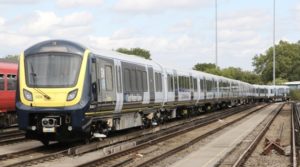
Keith Fender
LONDON — As widely expected, the British government has announced the end of the passenger franchise system introduced as the means of privatizing the rail industry in 1996 and will introduce a new concession system to take its place.
U.K. Transportation Secretary Grant Shapps told the media last month, “The model of privatization adopted 25 years ago has seen significant rises in passenger numbers, but this pandemic has proven that it is no longer working.” Between April and June of this year, ridership fell to 8% of pre-pandemic levels [see “Digest: Amtrak to resume service …,” Oct. 9, 2020], leading to extensive government subsidies.
Shapps promised that in the future, “Passengers will have reliable, safe services on a network totally built around them,” although how this will happen has not yet been revealed. The decision is less to do with political ideology and more to do with economic reality; the government making the decision to end franchising in 2020 is from the very same Conservative party that introduced the privatization in the first place.
The previous franchise agreements saw private operators taking risks on the overall business plan, so revenue growing above expectation could result in handsome profits and, conversely, revenue below plan meant substantial losses. Franchise holders paid the government for the privilege of holding the contract and were liable for some losses and unforeseen costs. Despite the arrangement being described as privatization, there was still considerable government funding in the industry, either directly to the less profitable franchises, or in all cases to the national rail network infrastructure company, Network Rail.
Industry experts considered only one or two of the previous 20-plus franchises to be genuinely profitable, i.e., not requiring, or fully repaying, the government support they got. Two of the UK’s franchise operators (East Coast operator LNER and the “Northern” regional/commuter rail network in Northern England) had already been replaced by a directly government-run company before the lockdown, and others were in financial difficulty before the pandemic.
Details on concession system yet to be worked out
In the short term, emergency contracts put in place during the UK’s COVID lockdown in March, which paid the private operating companies a 2% margin on agreed expenses, have been replaced by new contracts that pay less (1.5% is the norm) and have performance penalties built in. Longer term, the British government has said it will introduce a new concession system starting in 2021, although the details have yet to be worked out in full. This is likely to be something like the system used by U.S. commuter rail systems, where a private company is paid to operate the service for a public agency, as with Keolis operating the traints for the Massachusetts Bay Transportation Authority, for example.
Private companies are very unlikely to be willing to take any level of risk around future revenues, as business travel has fallen dramatically and commuter numbers into London and other big cities have collapsed. Working from home is now the “new normal,”and likely to remain that way for most office workers, possibly most of the time in the future.
Experience in Europe where the concession system is well established shows that where contracts are awarded on lowest cost of operation, as they commonly are in Germany, this results in the government taking the revenue risk. This works for both train operator and government when times are good, but in the pandemic has left some big gaps in budgets for governments which have to be filled with money from somewhere else. In some cases, concessions have been awarded where the train operator keeps the ticket income and takes the risk on it. These are very unlikely to be awarded in the next few years as they are simply too risky. A recent example in the Netherlands saw no bidders for a contract to operate a single regional line — and that included the line’s existing operator.









